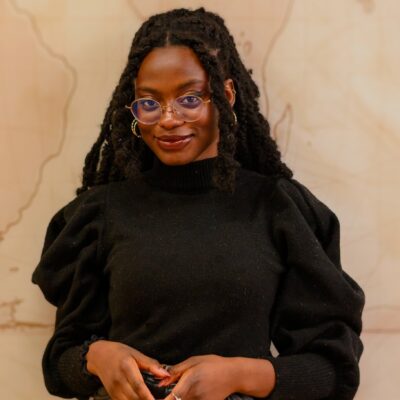Student Spotlight: Danielle Obisie-Orlu

December 9, 2024
Danielle Obisie-Orlu is a doctoral student in government with a focus on international relations from Washington, D.C. and Johannesburg, South Africa. She earned her B.Phil. at the University of Pittsburgh and now studies how memory and migration shape international relations and affairs under the guidance of Oumar Ba at Cornell.
What is your area of research and why is it important?
I research two big “M”s shaping international relations and affairs: memory and migration. I research how states use narratives of past traumas to navigate their contemporary relations and address challenges within international politics. On the other hand, I study how international law and organizations can be instrumentalized in improving states’ governance and cooperation on contemporary migration-related challenges within and beyond Africa. We live in a time where state-driven narratives of the past – and present their implications – are contested and reinforced not only at the domestic level but also at the international level. Furthermore, states’ responses to migration as a security, human rights, or development issue continue to define the future of our generation and the generations to come.
What are the larger implications of this research?
My research on memory reveals how states transform collective trauma memories into powerful diplomatic assets, creating a paradox where deeply resonant and painful histories can be used as a source of contemporary power. Analyzing cases, I explore how memory is embedded into current power structures. I demonstrate how states leverage traumatic memories of the past conceptually and instrumentally in trade, security, etc. This process could explain why some states successfully deflect international criticism for their actions while others face immediate condemnation and how historical trauma narratives influence modern foreign policy decisions. By reconceptualizing collective memory as sociopolitical capital on an international scale, my work offers theoretical insights and practical guidance for navigating a liberal order where narratives of the past influence dynamics in the present.
Why did you run for the graduate/professional student-elected trustee position?
As a first-year graduate student, I saw how disconnected and divided students felt about the university’s decision-making processes. I recognized the need for three things: increasing efforts to rebuild trust within the Cornell community with a focus on transparency, equitable access to resources across campus, and actions to bridge the seemingly divided interests of the university administration and students. The graduate/professional student-elected trustee position presented a unique opportunity to help build bridges between different university stakeholders. My goal was to serve as a thoughtful liaison, compelling advocate, and service-oriented community member, ensuring graduate student insights enrich Cornell’s continued growth.
What does having this opportunity mean to you?
Being a trustee is both an honor and a profound responsibility. For me, it goes beyond having a seat at the table – it’s about ensuring Cornell’s enduring promise of “any person, any study” remains a living and attainable commitment. This means that I have the responsibility of giving voice to our diverse graduate and professional student body, who pursue groundbreaking research and excel in their fields while navigating housing, transportation, and health care uncertainties. This role is about working alongside university leadership in the spirit of collaboration, compassion, and a commitment to working toward a transformative future. I am excited to have this opportunity to be a bridge – a meeting place for diverse perspectives and a path toward collaborative progress.
What do you hope to achieve as graduate and professional student-elected trustee?
During my term, I hope to use my position to give voice to student concerns about resources, equity, and accessibility on campus. I am committed to working as a liaison to improve the sharing of perspectives between Cornell and its students. This is a key part of rebuilding trust within our community. I plan to conduct graduate and professional student surveys and collaborate with the Graduate and Professional Student Assembly and administration to develop concrete solutions to the most pressing social, economic, and community concerns. Whether that is working toward expanding TCAT accessibility or presenting proposals that reiterate the importance of tenant advocacy support, I am committed to fostering an environment where every graduate student feels they can trust that they belong here and can thrive as a member of the Cornell community.
What are your hobbies or interests outside of your research or scholarship?
I grew up with a passion for creating new worlds through the power of words and sharing my experiences through the power of storytelling, so I naturally fell in love with public speaking, poetry, and performance art. I am a poet! I am the former Youth Poet Laureate of Allegheny County (2021-2022) and Northeastern Regional Runner-Up (2022). As part of my poetry, I tell stories about belonging, homecoming, and hope in a time of crisis. As a proud product of migration and embracing the complexity of our shared humanity, I love to work with migrant and underrepresented youth by teaching them how to amplify their voices for their self-confidence and transformative social change.
Why did you choose Cornell to pursue your degree?
What drew me to Cornell was the interdisciplinary nature of the field of government. My interests ranged between international relations, sociology, international law, and migration studies. I knew I wanted to find a program that would allow me to hone my skills while encouraging me to diversify the knowledge I used to enrich my primary research inquiry. Both faculty and students within the department encouraged me to embrace a multifaceted approach to addressing complex questions shaping global politics and directed me towards a course of study minor, where I could develop a research agenda beyond the existing subfields in the department. Through this course of study, I now research international law, international migration governance, and xenophobia with faculty from the Law School. Cornell has a long history of producing and housing constructivist and critical scholar-practitioners, and I hope to both benefit from and contribute to that legacy.
